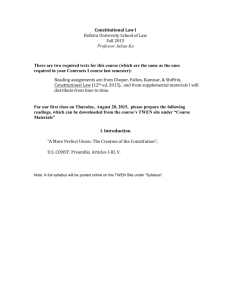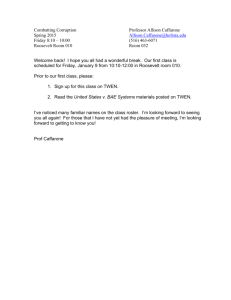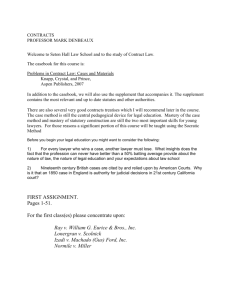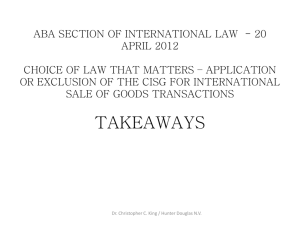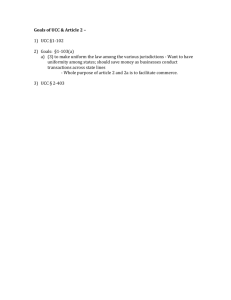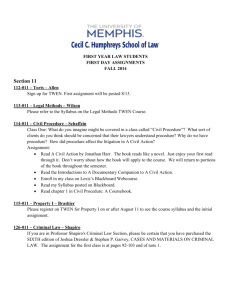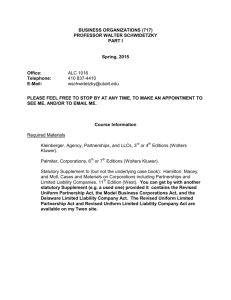1 Sales and Leases– FALL 2015 Professor Jones Havard chavard
advertisement
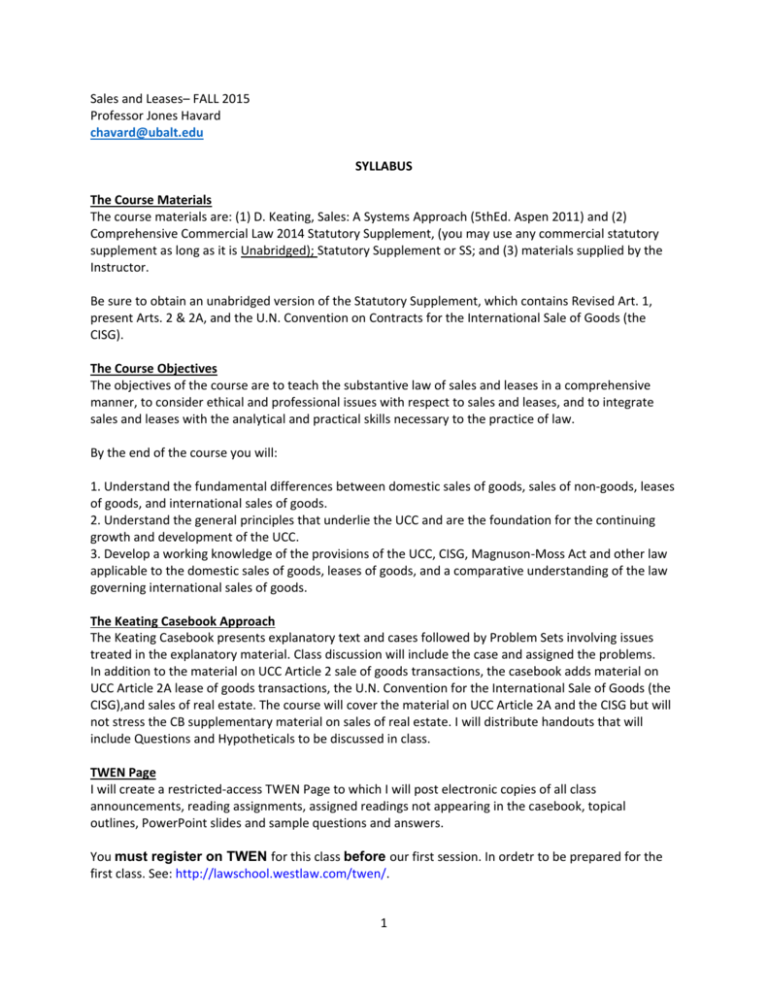
Sales and Leases– FALL 2015 Professor Jones Havard chavard@ubalt.edu SYLLABUS The Course Materials The course materials are: (1) D. Keating, Sales: A Systems Approach (5thEd. Aspen 2011) and (2) Comprehensive Commercial Law 2014 Statutory Supplement, (you may use any commercial statutory supplement as long as it is Unabridged); Statutory Supplement or SS; and (3) materials supplied by the Instructor. Be sure to obtain an unabridged version of the Statutory Supplement, which contains Revised Art. 1, present Arts. 2 & 2A, and the U.N. Convention on Contracts for the International Sale of Goods (the CISG). The Course Objectives The objectives of the course are to teach the substantive law of sales and leases in a comprehensive manner, to consider ethical and professional issues with respect to sales and leases, and to integrate sales and leases with the analytical and practical skills necessary to the practice of law. By the end of the course you will: 1. Understand the fundamental differences between domestic sales of goods, sales of non-goods, leases of goods, and international sales of goods. 2. Understand the general principles that underlie the UCC and are the foundation for the continuing growth and development of the UCC. 3. Develop a working knowledge of the provisions of the UCC, CISG, Magnuson-Moss Act and other law applicable to the domestic sales of goods, leases of goods, and a comparative understanding of the law governing international sales of goods. The Keating Casebook Approach The Keating Casebook presents explanatory text and cases followed by Problem Sets involving issues treated in the explanatory material. Class discussion will include the case and assigned the problems. In addition to the material on UCC Article 2 sale of goods transactions, the casebook adds material on UCC Article 2A lease of goods transactions, the U.N. Convention for the International Sale of Goods (the CISG),and sales of real estate. The course will cover the material on UCC Article 2A and the CISG but will not stress the CB supplementary material on sales of real estate. I will distribute handouts that will include Questions and Hypotheticals to be discussed in class. TWEN Page I will create a restricted-access TWEN Page to which I will post electronic copies of all class announcements, reading assignments, assigned readings not appearing in the casebook, topical outlines, PowerPoint slides and sample questions and answers. You must register on TWEN for this class before our first session. In ordetr to be prepared for the first class. See: http://lawschool.westlaw.com/twen/. 1 Assignments Assignment for the first class session: Discussion of (1) the Syllabus and (2) the Contracts Diagnostic Test (available on TWEN). Assignment for the second class session Discussion of (1) Assignment 1, CB pp.1-22; and (2) CB Problems, 1.1, 1.2, 1.3, 1.4 1.5 and 1.6 Assignment for the third and fourth class sessions: Discussion of (1) any remaining aspects of Assignment 1 and (2) CB Problems 2.1 2.4, 2.5 & 2.6. Future assignments: Keep two Problem Sets ahead of the Problem Set on which discussion ends. Under the law school’s attendance rule, a student is entitled to six absences, excused or unexcused. Attendance will be taken on a roll sheet that students are expected to sign during each class period. A failure to sign the roll sheet is deemed to be an absence. Computer Policy Computers are to be used during class for taking notes and no other purpose. They are not to be used to “surf the net” or send e-mail or instant messages. Violations of this rule may lead to you being prohibited from using a laptop during class. Class Performance Policy A student’s grade can be raised one notch for outstanding class performance or lowered one notch for poor class performance. Final Grade The examination will be approximately three hours in length and will most likely be a mix of essay and multiple choice questions. You may take a copy of the Statutory Supplement into the exam. The Law of the Course In situations in which different legal rules could apply, the legal rules that are designated the Law of the Course control. Revised UCC Art.1, which is designated the 2014 Official Text of Art. 1 by the SS and has been widely adopted, for example, is the Law of the Course. However, Revised Articles 2 and 2A, which have not been adopted anywhere and are omitted from the SS, are not the Law of the Course. Unrevised Arts. 2 and 2A, which are designated as 2014Official Texts by the SS, are the Law of the Course and are referred to as Art. 2 and Art. 2A. 2

